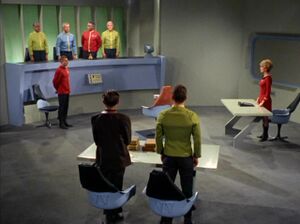Starfleet Judge Advocate General's Corps: Difference between revisions
More actions
CrimsonTacit (talk | contribs) No edit summary |
Teylasramar (talk | contribs) No edit summary |
||
| Line 1: | Line 1: | ||
{{Icons|bfc|sf|fed}} | |||
{{Organisation | {{Organisation | ||
|name= Starfleet Judge Advocate General's Corps | |name= Starfleet Judge Advocate General's Corps | ||
Latest revision as of 16:34, 9 March 2024
The Starfleet Judge Advocate General's Corps is the judicial arm of Starfleet, responsible for ensuring the fair and consistent application of the Uniform Code of Justice alongside Local, Federation, and Interstellar laws. Consisting of highly-trained lawyers known as judge advocates, this corps, like the Starfleet Inspector General's Corps, reports directly to the Federation Council and not to Starfleet Command.
Leadership
The Judge Advocate General's Corps is led by the Starfleet Judge Advocate General, who is appointed by the President of the United Federation of Planets with the advice and consent of the Federation Council. Always a flag officer, and often an extremely senior flag officer, the Starfleet JAG is the chief legal advisor to the Commander-in-Chief. The Starfleet JAG is assisted by the Deputy JAG, Associate JAGs, and Assistant JAGs.
Training
Starfleet lawyers, known as Judge Advocates, are all officers who receive their educations from Starfleet Academy and the Starfleet Legal Academy or through a civilian law program followed by Officer Candidate School. New judge advocates are commissioned at the rank of lieutenant junior grade, as with physicians and counselors. As with those other career paths, judge advocates must pass the Bridge Officer's Examination before being promoted past the rank of lieutenant commander. Enlisted paralegal specialists are trained through a one-year program under Starfleet Enlisted Training Command.
Organizational Structure
The majority of the JAG Corps is assigned to starbases around the Federation. Thus, the organizational structure and appeals system in the JAG system is arranged on what is essentially a federalized system: starbases reporting to sectors, which report to regional offices, which report to the JAG headquarters.
The Starfleet Judge Advocate General's Office

The Judge Advocate General's Office administers the entire JAG Corps from its headquarters on Earth. The Deputy Judge Advocate General oversees general policy for the Corps and the Starfleet Legal Academy. The three Associate Judge Advocates General lead the Criminal Law, Administrative Law, and Civil Law divisions, with multiple Assistant Judge Advocates General working under them. The JAG Office also maintains three Appeals Tribunals for Criminal, Administrative, and Civil Matters, each composed of three Justices—admirals or fleet admirals who are former JAGs themselves or other former senior fleet officials.
Fleet Judge Advocate Offices
Fleet Judge Advocate Offices serve two functions: to advise the command staff of the fleet they are assigned to on legal matters and to serve as the appellate venue for matters decided at the sector level. The Fleet Judge Advocate themself is also the Command Judge Advocate to the Fleet Commander. They are assisted by a Deputy Fleet Judge Advocate, as well as an Associate Fleet Judge Advocate each for Criminal, Administrative, and Civil divisions who are supported by Assistant Fleet Judge Advocates, mirroring the structure of the Starfleet JAG office itself. Fleet Judge Advocate Offices primarily serve in an appellate capacity, but the Fleet Commander may raise any matter from a lower venue directly to the fleet level at their discretion.
Sector Judge Advocate Offices
Sector Judge Advocate Offices are the centralized judicial authority in a single sector of space. They have original jurisdiction over felony, civil and administrative matters in their sectors and appellate jurisdiction for misdemeanor matters, which are decided at the local starbase or starship level. The sector commander may also at their discretion raise any matter from a lower venue directly to the sector level, but this is rare. Sector Judge Advocates, like Fleet Judge Advocates, are assisted by Deputy, Associate, and Assistant Sector Judge Advocates, though more remote sectors have smaller staffs.
Starbase Judge Advocate Detachments
Starbase Judge Advocate Detachments are present on almost all starbases and provide direct legal services to members of Starfleet and civilians. These detachments are the ways that most individuals will interface directly with the JAG corps and they make up of the bulk of the assignments within the corps itself. These detachments have prosecutorial oversight for misdemeanor cases on their stations, but must make recommendations at the sector level for felony cases. They also provide legal services to nearby starships when necessary. Starbase Judge Advocate Departments are led by a Supervising Staff Judge Advocate, who oversees three Associate Staff Judge Advocates, who in turn oversee Assistant Staff Judge Advocates, who take on the majority of the actual casework.
Starship Judge Advocate Detachments
Some very large ships have their own JAG detachments, especially flagships or ships deployed on missions far from stations. While it is preferable for a vessel to return to port if a court-martial is necessary, Starfleet captains (with or without onboard JAG support) may administer justice and discipline on misdemeanor matters and shipboard JAG detachments support them in this duty.
Courts-Martial

Felony matters require a referral to the closest sector JAG station, where a judgement will be made by the sector commanding officer whether or not to pursue charges. Those charged with felonies have a right to a court-martial which will have a panel of at least four command or flag-grade officers, which will include the sector commanding officer as president of the court in most cases. Punishments may include demotions, sentences to penal colonies, and/or expulsion from Starfleet.
The Appeals Process
Appealing the decision of a court-martial is the right of anyone who is convicted. Appeals follow both the JAG structure and the chain of command, maintaining balance between judicial authority and command authority, depending on the severity of the offense.
Misdemeanor matters may be appealed to the superior officer of the officer who issued the original judgement and then to the closest sector JAG station. Given that the punishments for these offenses is limited to thirty days, the appeals process does not allow for these cases to be escalated further. For example, a crewperson convicted of theft aboard a starship may appeal to the squadron commanding officer of the captain who issued that order and then the closest sector JAG station. (If the ship were not part of a squadron, the convicted person could appeal to the task group or task force commanding officer instead.)
Felony matters take a more complex appeals process. As felony trials always occur at the sector level, the first venue for an appeal is the Fleet JAG office of the numbered fleet overseeing the sector where the original conviction was made, and then to the commander of that fleet. Beyond that, an appeal would pass to the appeals courts at JAG headquarters, then to the JAG themself, and then to the Starfleet Commander-in-Chief. From there, the next step would be the Supreme Court of the United Federation of Planets, which has the last and final say on any appeals.
Special Cases

The President of the United Federation of Planets may at their discretion raise the criminal conduct of a member of Starfleet directly to the Federation Council. Such a move would be unthinkable for anyone other than a high-profile flag officer who has done something publicly egregious. This occurred in the case of the court-martial of the crew of the USS Enterprise following the theft and destruction of that vessel over the Genesis Planet in 2286. Any decision of the Council could theoretically be appealed to the Supreme Court, but this has never occurred.
